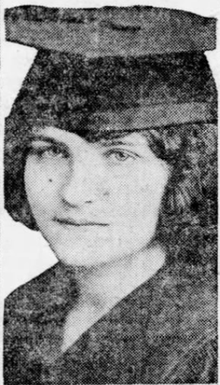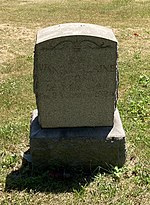Wanda Elaine Stopa | |
|---|---|
 | |
| Born | May 5, 1900 |
| Died | April 25, 1924 (aged 23) |
| Cause of death | Suicide by cyanide poisoning |
| Resting place | Bohemian National Cemetery, Chicago, Illinois |
| Occupation | District attorney |
Wanda Elaine Stopa (May 5, 1900 – April 25, 1924) was a Polish-American lawyer and murderer who committed suicide the day after committing her crime.
Life

Stopa was born in Warsaw, Poland, in 1900. She emigrated to the United States with her parents and siblings, ending up in Chicago's Little Poland neighborhood. Her father was a clay sculpture modeler in Chicago and her mother came from a prominent Polish family. While living in her parents' rigidly conformist home, she studied at The John Marshall Law School, passed the bar exam and became Chicago's youngest and first woman assistant U.S. district attorney. Others described her as extremely smart and of a dominating emotional nature. [1] [2]
In search of a more individualistic and independent lifestyle, Stopa moved to a studio with other creatives located in the Bohemian Towertown neighborhood. True to the reputation of the Roaring Twenties, the studio was the site of late night parties and non-traditional lifestyles. Stopa lived at the studio for three years; for one summer, an advertising executive named Y. Kenley Smith and his wife, a pianist, lived there as well.
Also living at the artists' studio was a Russian man whom Stopa married, variously referred to in the press as "Vlad", "Ted", "Glaskoff", "Glasko", "Glasgow" or "Glaskow". There is confusion about his background. He described himself as a count who lost a fortune in the Russian Revolution but Stopa's brothers portrayed him as a bootlegger and professional gambler. [3] He and Stopa separated soon after marrying.
Smith financially supported Stopa as an intellectual and artist. At some point, they began an affair. When Smith broke off the relationship, Stopa was extremely unhappy and demanded he leave his wife for her. [4] [5] Stopa traveled to the Smiths' Palos Park cottage on the outskirts of the city and tried to shoot her lover's wife, named Doodles, but accidentally shot and killed their 68-year old gardener, Henry Manning. Kenley Smith was at work in downtown Chicago at the time of the shooting and was quickly picked up by the authorities for his protection and for an interview. [6] Stopa fled the scene and led the police on a manhunt. [3]
Death

Stopa committed suicide by ingesting cyanide in a room in the Detroit Statler Hotel. Her brothers speculated that her estranged Russian husband provided the poison and described his influence on her life as "evil". [3] Crushed by the loss of their friend, the artists from the Bohemian studio asked to be involved with Stopa's funeral. Enticed by the nature of the tragic love story, her funeral drew many curious onlookers and gawkers, some accounts claiming as many as 10,000 people. [7] Stopa is buried at the Bohemian National Cemetery. [8] [9]
Popular culture
Ernest Hemingway was once a tenant and friend of Stopa's lover, Kenley Smith. After reading of the scandal in the newspaper, Hemingway privately reacted to it with dark amusement. [10]
In 2019, Stopa's story was featured in a Season 13 episode of the American television series Deadly Women, with Kelsie Feltrin portraying Stopa. [11]
Stopa's story was also the subject of episode 108 of the Chicago History Podcast.
The award-winning blog 1,001 Chicago Afternoons by Paul Dailing delved into the story in post number 283, named "The Murderess Down the Block".
References
- ^ "The Girls of Murder City". Chicago magazine. Retrieved January 15, 2020.
- ^ Britt, George (May 7, 1924). "Bohemias Golden Sun Leads Girl Prodigy-To Murder Charge". Humboldt Times. Retrieved June 23, 2022.
- ^ a b c "#283: The Murderess Down the Block, 1 of 2". 1,001 Chicago Afternoons. Retrieved January 15, 2020.
-
^ Zorbaugh, Harvey Warren (1983).
The Gold Coast and the Slum: A Sociological Study of Chicago's Near North Side. University of Chicago Press. p. 92.
ISBN
9780226989457.
Wanda Stopa, who had sought in Towertown escape from the life in Little Poland.
-
^ Seidel, Jon (September 20, 2019).
Second City Sinners: True Crime from Historic Chicago's Deadly Streets. Lyons Press. p. 154.
ISBN
9781493038466.
Smith said he eventually told Stopa they could no longer see each other. A month later, he said, she demanded either $1,000 for a trip to Europe or that he leave his wife for her.
- ^ Loerzel, Robert. "The Girls of Murder City, by Douglas Perry". Chicago magazine. Retrieved January 15, 2020.
- ^ "Wanda Stopa". Chicago Tribune. April 30, 1924. p. 3. Retrieved January 15, 2020.
- ^ "Woman Murderer Suicide in Detroit; Wanda Stopa, Who Killed Caretaker in Chicago Home, Takes Poison in Hotel". The New York Times. April 26, 1924. p. 1. ISSN 0362-4331. Retrieved January 15, 2020.
- ^ Bovsun, Mara (March 13, 2020). "Justice Story: Love made legal eagle lovesick and homicidal". New York Daily News. Retrieved June 24, 2022.
-
^ Reynolds, Michael S. (1999).
Hemingway: The Paris Years. Norton. p. 197.
ISBN
9780393318791.
Hadley showed him the April 28th Tribune with the juicy scandal in which his one time friend, Kenley Smith, was standing knee deep.
- ^ Kill the Competition, retrieved January 15, 2020
- 1900 births
- 1924 suicides
- 1924 murders in the United States
- Lawyers from Chicago
- American female murderers
- University of Illinois Chicago School of Law alumni
- Suicides in Michigan
- Burials at Bohemian National Cemetery (Chicago)
- History of Chicago
- 20th-century American lawyers
- Suicides by cyanide poisoning
- 20th-century American women lawyers
- Emigrants from the Russian Empire to the United States
- Polish murderers
- Emigrants from Congress Poland to the United States
- 19th-century American lawyers
- 1924 deaths
- 19th-century American women lawyers